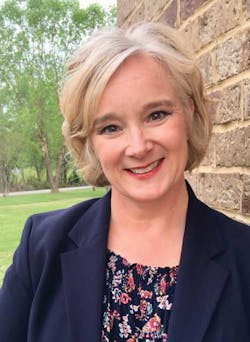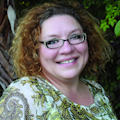Meet Kristie M. Campbell, Administrative Director of Huntsville Hospital Clinical Laboratory
Congratulations on your new role! How did your career path lead to this management position? I started my career at Huntsville Hospital as a Central Processing employee in the lab. After obtaining my degree, I spent time as a generalist and also a Blood Bank bench tech. Prior to being named Administrative Director, I held several leadership positions within our laboratory including Manager of Outreach Operations and Point-of-Care (POC) Testing and Supervisor of Pre-Analytics and Referral Testing.
My time managing the POC department gave me a deepened appreciation for our clinical staff and the challenges they face in providing excellent patient care services, a perspective that helps when embarking on collaborative efforts.
These experiences have been crucial to my success as they provided a broad understanding of how our lab functions internally, particularly in balancing the Inpatient and Outreach workloads, and externally in understanding how our services support the success of our hospital.
Please give us some background on Huntsville Hospital and its lab. Huntsville is the third-largest publicly owned hospital in the U.S. It is a 971 bed facility providing Level 1 Trauma services and Award Winning Stroke and Cardiovascular Services. We provide specialty services at our Women’s and Children’s Hospital including a Pediatric Emergency Department, Regional Neonatal Intensive Care Unit, and a St. Jude Affiliate Clinic. Huntsville Hospital is part of a growing system in North Alabama which includes seven other hospital facilities.
The Huntsville Hospital Laboratory is a highly advanced and automated lab, however, our most valuable asset is our people. They are highly trained Clinical Laboratory Scientist (CLS) experts who are committed to the patients we serve and strive to make every decision with the patients’ best interests at heart.
What can you tell us about the POC program at Huntsville Hospital? The POC program is just over 20 years old, with our highest volume tests being Arterial Blood Gases and Finger-stick Glucose testing. The department consists of 3.6 FTE’s who manage a total of 375 devices. We have 2,500 trained end users of POC equipment and perform over 930,000 tests annually.
Our primary challenge is managing regulatory requirements for a large population of end users and large device inventory. We accomplish this through collaborative efforts with our Clinical Educators and a POC staff who are highly committed to quality and serving the patient. The biggest opportunity lies in our ability to bring the value added service of timely lab results to our most critical patients in support of efficient operations in all areas of clinical care.
And the Sepsis program? Point-of-care was involved in the identification of septic patients early on. We began by using the Lactate assay as a screening tool for sepsis in the emergency department and as the project gained momentum, we quickly ramped up use of the Lactate assay to many patient care departments. The use of POC testing aids in meeting sepsis care guidelines which involves initiating interventions in a very brief time frame. This is crucial with septic patients in light of the fact that for every hour a septic patient goes without antibiotic treatment, their mortality rate increases by 8 percent.
How is the medical personnel shortage impacting the laboratory at Huntsville Hospital? The shortage of medical personnel is a concern throughout the healthcare industry, however a strategic decision to pursue automation in our lab has helped us weather the storm of staffing shortages. Automation has been a constant pursuit for our lab since the early-mid 90’s when we began our Outreach program.Because of our level of automation and the efficiencies gained, we have been able to continue to expand our in-house test menu.
Other efforts to mitigate staffing shortages include providing Lab Career Path information sessions to our laboratory support personnel, increasing efforts to recruit the best students from our CLS schools, and investing in our local CLS programs in an advisory role and actively hosting students for their clinical rotations.
What is your advice for youth wanting to enter the clinical laboratory field? My advice for those considering the clinical laboratory field would be the same as to those considering any career in healthcare. A career in healthcare is NOT like what is portrayed on TV shows! Participate in shadowing and volunteer programs before committing to a healthcare career. It is one of the most challenging career paths and demands a tremendous amount of personal commitment and sacrifice. However, it can also be very fulfilling to those who have a calling to serve and minister to others.
What are Huntsville Hospital Laboratory’s biggest challenges? The biggest challenges include increasing financial pressures in an environment of declining reimbursements and maintaining a presence as a valuable component of a thriving healthcare system (avoiding being considered a commodity). The need to function more efficiently within our system, by leveraging testing capacity at all affiliated labs while consolidating areas where it makes sense, is also relevant.
What profession other than your own would you like to attempt? Practically speaking, teaching and consultation. One of the most fulfilling aspects of my career has been the opportunities I’ve had to teach others—whether training a fellow laboratorian, teaching a nurse how to use a POC device, or mentoring a new leader. It’s very gratifying to know that you have invested in the success of others. An impractical career that I would like to attempt is a professional singer!
Professional
I currently serve as Administrative Director of Huntsville Hospital’s Clinical Laboratory.
Education
Bachelors of Applied Sciences, Certificate of Medical Technology, University of Alabama at Birmingham; MBA with Healthcare Management Focus, University of North Alabama
Personal
My family enjoys spending time outdoors, particularly boating. We also like to travel. I love to sing and read.

